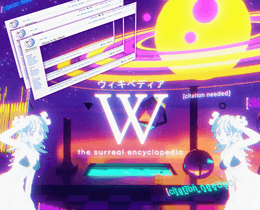Post-Internet
Post-Internet is an art movement and a loose descriptor[1] for works that are derived from the Internet or its effects on aesthetics, culture and society.[2][3] The term emerged from mid-2000s discussions about Internet Art by Marisa Olson, Gene McHugh, and Artie Vierkant.[4] Between the 2000s and 2010s, post-Internet artists were largely the domain of millennials operating on web platforms such as Tumblr and MySpace. The movement is also responsible for spearheading slews of microgenres and subcultures such as seapunk and vaporwave.[1]

The term is controversial and highly criticized in the art community.[1] According to a 2015 article in The New Yorker, the term describes "the practices of artists who ... unlike those of previous generations, [employ] the Web [as] just another medium, like painting or sculpture. Their artworks move fluidly between spaces, appearing sometimes on a screen, other times in a gallery."[5] In the early 2010s, "post-Internet" was popularly associated with the musician Grimes, who used the term to describe her work at a time when post-Internet concepts were not typically discussed in mainstream music arenas.[6]
See also
References
- Amarca, Nico (March 1, 2016). "From Bucket Hats to Pokémon: Breaking Down Yung Lean's Style". High Snobiety. Retrieved May 24, 2020.
- Wallace, Ian (March 18, 2014). "What Is Post-Internet Art? Understanding the Revolutionary New Art Movement". Artspace.
- The term “post-internet” refers not to a time 'after' the internet, but rather to an internet state of mind..., is written on a press release for Art Post-Internet, an exhibition organized by the Ullens Center for Contemporary Art
- Connor, Michael (November 1, 2013). "What's Postinternet Got to do with Net Art?". Rhizome.
- Kenneth, Goldsmith (2015-03-10). "Post-Internet Poetry Comes of Age". The New Yorker. Retrieved 2016-09-14.
- Snapes, Laura (February 19, 2020). "Pop star, producer or pariah? The conflicted brilliance of Grimes". The Guardian.
External links
- "Post-Internet Materialism". metropolism.com. Retrieved 2015-03-15. An interview with Martijn Hendriks & Katja Novitskova
- [ http://booktwo.org/notebook/new-aesthetic-politics/ "The New Aesthetic and its Politics"]
- "Finally, a Semi-Definitive Definition of Post-Internet Art". Art F City.